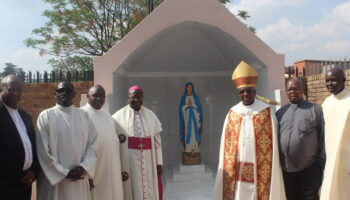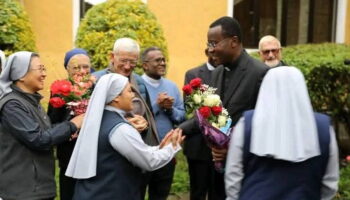
After three years of research-study in the Faculty of Canon Law at the Pontifical Urbaniana University in Rome, Tanzanian Consolata missionary Father Thomas Leon Mushi defended this Friday, 14 June 2024, his doctoral thesis entitled “The Duration of the Religious Parish Priest in the Office”.
The study on the relationship between cannons 522 and 682 awarded Father Mushi the title of Doctor of Canon Law.
We publish a brief presentation of his thesis in this article written by the author himself.
THE DURATION OF THE RELIGIOUS PARISH PRIEST IN THE OFFICE: The study on the relationship between cans. 522 and 682.
Presentation of the doctoral thesis in Canon law
MUSHI Thomas Leon, IMC (14/6/2024).
Motivations
The interest in undertaking this study stems precisely from my religious and missionary vocation. Having met various religious missionaries working in the sector as parish priests, I have cultivated an interest in deepening my knowledge of the ministry of a parish priest specifically of the religious parish priest. However, the theme of the religious parish priest is very vast, and therefore, thanks to the advice of the Moderator of the thesis, Prof. Paul Armand Bosso, I was able to narrow the field to a specific and concrete aspect.
Also prompted by the experience gained from observing religious parish priests in my country of origin in Tanzania, as well as in our missions in Mozambique and Portugal, I decided to work on the aspect of the “duration in the office”. Seeing religious parish priests moved (removed or transferred) with ease and after a short period in office, prompted me to focus on this aspect with the aim of offering clarity in this regard, and possibly contributing with an instrument that would serve as a manual to the major superiors of religious institutes as well as to the local Ordinaries for the matter of religious parish priests.

What’s New
The novelty of this study is, as already mentioned, in the title: “The duration in the office of the Religious Parish Priest.” In our research, we have shown that this field of interest, the religious parish priest has been little researched and discussed, and much less on issues concerning the duration in the office. The reasons are obvious; it ia because it is not specified by the current law. The expression that research looks at carefully is “ad nutum superiorii” in can. 682 without direct consideration of can. 522 which demands “stabilitas” to guarantee the good of the souls. Under the current law, a provision ad vitam is less frequent than appointment ad tempus determinatum. The office of parish priest conferred on to a religious priest and its ceasing is done according to the provisions of can… 682, §§1-2. In addition, in the general procedure for removal and transfer from the office of a parish priest, the religious parish priest is treated as an exception. He can stay there for 3 months, a year, or 20 years, depending on the discretion of his competent superior. But no guarantee is given for a minimum time for the good of the souls entrusted to him.

The division of labour
Our work is divided into three chapters. The first chapter deals with the juridical configuration of entrusting a parish to a religious institute. In this chapter we have tried to deepen the case of the entrustment of parishes to religious institutes or to religious clerics individually. The chapter concludes with a particular consideration of the juridical personality of the holder of the office of parish priest and his relationship with his religious community and with the competent authorities. In all this, just as required by the current Code (can. 681, §2), research has highlighted the importance of the act of entrustment (convetion), that is, the agreement between the local Ordinaries and the competent religious superiors. The conclusion indicates how to solve the problem of duration through the convention or agreements as part of the indispensable clauses.
The second deals with the status quaestionis of the research, that is, the duration in office of the parish priest in general with references to the juridical consideration, also valid for the religious parish priest, that the parish priest regardless of his status of incardination is called to serve the people of God in collaboration with the local Ordinary. The aspect common to all parish priests is “the good of souls”. It is a chapter of a comparative nature, necessarily thinking of the relationship between two important cann. 522 and 682, §1. Both canons deal with the duration of the parish priest’s office. The study also goes through the decree Maxima cura, which led to the provisions of the Benedictine Code of God, as well as the apostolate of religious, as recommended by some conciliar and post-conciliar documents of the Second Vatican Council. We as well examine the determination of duration based on the criteria and role played by the Episcopal Conferences. The conclusion indicates the solution to the problem by considering can. 522 when applying can. 682.
The third chapter is devoted to an in-depth study of the cases of the conferral and removal of a religious parish priest in can. 682, §§ 1-2. In this case, our research underlines the norm of law as a means by which the stability of the religious parish priest can be guaranteed, which really depends on the duration in terms of the timing of the provision and the ceasing of the office. In order to guarantee the duration of the provision, as in the first chapter we present the instrument of control, there is the possibility of administrative or hierarchical recourse up to the Apostolic Signatura.

Conclusioni
Without claiming to be exhaustive in understanding the question of the religious parish priest which has determined our research, it is clear that the deepening of knowledge about the office of a parish priest entrusted to a religious priest has developed precisely from the historical context of the practice and the importance of the office itself. Based on the results, it is indicative that the role of the religious in the local Church is important and positive. In part, religious identity does not cease to be so thanks to pastoral activities outside the religious house at the service of the diocese and the universal Church in general. Following the charism of their institute, religious priests carry out their ministry, keeping in mind the prescriptions of cans. 673 and 678 §2.
Through this research, we examined the duration of a religious parish priest in the office from a historical and juridical point of view, so as to establish a possible procedure to ensure stability in the office for the good of the souls in the Church. The research has examined it from the juridical point of view particularly the configuration of entrusting a parish to a religious institute. Looking at the reality, we saw that it is an undeniable fact that the number of parishes entrusted to religious institutes has increased in recent decades in almost the entire Church. There are several reasons, but in general it is the limited number of diocesan priests needed to respond to the growing spiritual needs of the faithful. For this reason, the religious in charge of parish ministry are called to be faithful to the charism of their institute throughout the exercise of their office.

Generally, the Universal law regulates various aspects: the life of the faithful within the Catholic Church and their conduct, with the aim of maintaining order. Among these aspects, there are ecclesiastical offices that are entrusted to natural persons. The law, in dealing with such offices and the persons to whom they are entrusted, cannot ignore their status, for example, as diocesan or religious clerics. The dynamics of entrustment, although similar, the conditions vary from the dispositions of one Episcopal Conference to another. Just to give an example of what is different, let’s compare the Italian Episcopal Conference (CEI) to the Tanzanian Episcopal Conference (TEC) in which one (the former) in its dynamics it also includes the remuneration of the holders of ecclesiastical offices, such as the parish priest, while the other (the latter) effectively seeks the help of the office holders without a guarantee of remuneration.
In fact, it may be the opposite, that the holders of the ecclesiastical office also seek the means to support their work and their pastoral initiatives and help the needy within the territory. Thus, in both realities the priests work for the same purpose, but the consideration given to the workers is different depending on the circumstances, geographic and especially the economic context. With this concern we agree that “Universal law, in its generality, cannot foresee all eventualities. Occasionally there are shortcomings, incompleteness, inadequacies, casus omissus, and even gaps within the legislative body.”[1]
The conferral of the parish office on to a religious by the diocesan Bishop cannot be carried out without the presentation or at least the consent of the competent religious superior (cf. can. 682, §§1-2). Through this procedure, the religious parish priest becomes subject to the diocesan Bishop in all matters of the pastoral care of souls and to his competent Superior with regard to his religious state and the institute to which he belongs. Moreover, the religious state is not in itself incompatible with parish ministry. What is really important is to seek the correct way in which religious can express and live the charism of their own religious institute while exercising their parish ministry. The pastoral ministry of the religious will certainly be influenced by their charism, especially by the spiritual and pastoral lifestyle to which they are called by God through their vocation.

Concretely, an attempt has been made to show the juridical configuration of the entrustment of a parish to religious, as it has been examined in the formulation of the relationship between the two canons (682 and 522), giving some possible reasons why canon 682 seems to lack something when it deals with the question of the time limits of the appointment of a religious as parish priest. This work has highlighted the information that should be contained; In particular, the one about how long a religious parish priest should last in the office.
This “ambiguity” is rooted in the whole dynamic of the appointment, transfer and/or removal of a religious from office. This is due to the fact that the powers of the superior responsible for such administrative acts are unchecked and this may leave room for possible abuses of the discretionary power. The duration of the appointment of a religious parish priest in the light of the relationship between two important canons (can. 522 and can. 682 §1) raises the question: “What is the necessary reason for a parish priest to be stable in his office?” The research has affirmed that in this case, the determination of what really matters is: the good of the souls and that of the office holder.
From this research study, we have seen that clearly the law must guarantee both: the good of souls and the good of the office holder. The Second Vatican Council profoundly modified both the concept of office, in which the service of souls is the principal goal (cf. the definition of office in Presbyterorum ordinis, n. 20), and the reason for stability, which is above all “the good of the souls”. The Second Vatican Council puts it this way: “Parish priests in their parishes must be able to enjoy that stability in office which the good of the souls requires.” No distinction should be made, therefore, between parish priests; It is always better for everyone to be treated equally and for the same goal. We therefore, without a doubt, agree that the reason for stability is the good of the souls and being so, the parish priests whether religious or diocesan, must enjoy that stability in their office which the good of souls requires.[2] In fact, the ministry of a religious parish priest is not different from that of a diocesan parish priest. It avails itself of the specific tasks of the responsibility of the parish, of its particular functions of worship and evangelization, of the paternal and spiritual guidance of the faithful, as well as of the various administrative tasks connected with the day-to-day management of the parish’s resources and charitable activities. The underlying factor is the fact that the munus of the parish priest is essentially of a pastoral nature: as some canonists affirm, greater emphasis should be placed on the central objective, which is collaboration with the bishop in the noble mission of the care of the souls. The good of souls must be at the top of the scale of importance, that is, it must be taken as an indispensable indicator above the good of the religious institute.

The current Code is silent (in part) on the procedure for the removal or transfer of a religious parish priest. It considers only ad nutum superioris or in other words it is under the discretion of competent superiors. We are of the opinion that there should be fair treatment of all parish priests, regardless of their status. This should be taken seriously because it is not only the competent religious superior who can remove, but also the diocesan bishop and his equivalents too. This consideration would guarantee the attainment and permanence of the supreme goal of pastoral care, which is the good of souls. Thus, the religious parish priest should be considered in the process of removal described by the cans. 1740-1747 explicitly, rather than being treated as an exception, ad nutum (cf. can. 682).
The responsibility for filling the gaps in universal and proper laws falls into the hands of those who exercise public power within the Church. Pursuant to can. 19 of the 1983 Code, both the universal Legislator and the competent internal authorities with legislative and executive functions within the institutes of Pontifical right have the duty to fill these gaps for better administration by major superiors and for the protection of individual rights within the institutes against every form of abuse of authority. It is our conviction that the responsible authorities will revise the Universal law in order to fill in the gaps in the laws that regulate the religious parish priest.
In addition, the General Chapters have an unavoidable role in establishing clearly the practice of accepting perishes entrusted to them and the responsibility of the competent superiors to appoint parish priests, who will be instituted by the local Ordinaries. There should also be a possibility of asserting one’s rights in case of the violation of the law in procedendo or decernendo. The Holy See remains responsible for providing the general norms to be followed for emission of singular administrative acts and procedures for the assertion of rights through administrative, or hierarchical, recourse whenever the rights of the individual have been violated.

And finally, conscious of the principle “Ubi lex non distinguit, nec nos distinguere debemus“, the research makes concrete proposals for the solution of the problem of the duration in the office of the religious parish priest:
i) That the duration should be specified in the convention, calling upon the competent superiors to respect the times defined by the local Episcopal Conference, or that the time agreed for the provision should be established with a specific clause of the convention.
ii) Throug adding to the canon of the provision of the office itself by making a reference to can. 522 (for example: can. 682 §2 would be as follows: “Without prejudice to the provisions of can. 522, A religious can be removed from the office entrusted to him or her at the discretion either of the entrusting authority after having informed the religious superior or of the superior after having informed the one entrusting; neither requires the consent of the other.”
iii) That the religious parish priests should be treated in the same way as other diocesan parish priests for removal or transfer from office and not, instead, as an exception, protecting the good of the soul and not of the religious institute. And, in all this, it is appropriate that the parish priests themselves be aware of the instrument of control at their disposal, that is, the administrative and hierarchical recourse in order to be able to make use of it in case of a violation of law in procedendo or in decernendo.
* Father Thomas Leon Mushi, IMC, is a Tanzanian Consolata missionary with a doctorate in Canon Law.
[1] J. O. Okello, The Power of Major Superiors of Religious Institutes of Pontifical Right to Dispense from General and Proper Laws, PUB Rome 2021, 801.
[2] Cf. F. Coccopalmerio, The parish. Between the Second Vatican Council and the Code of Canon Law, 165.





